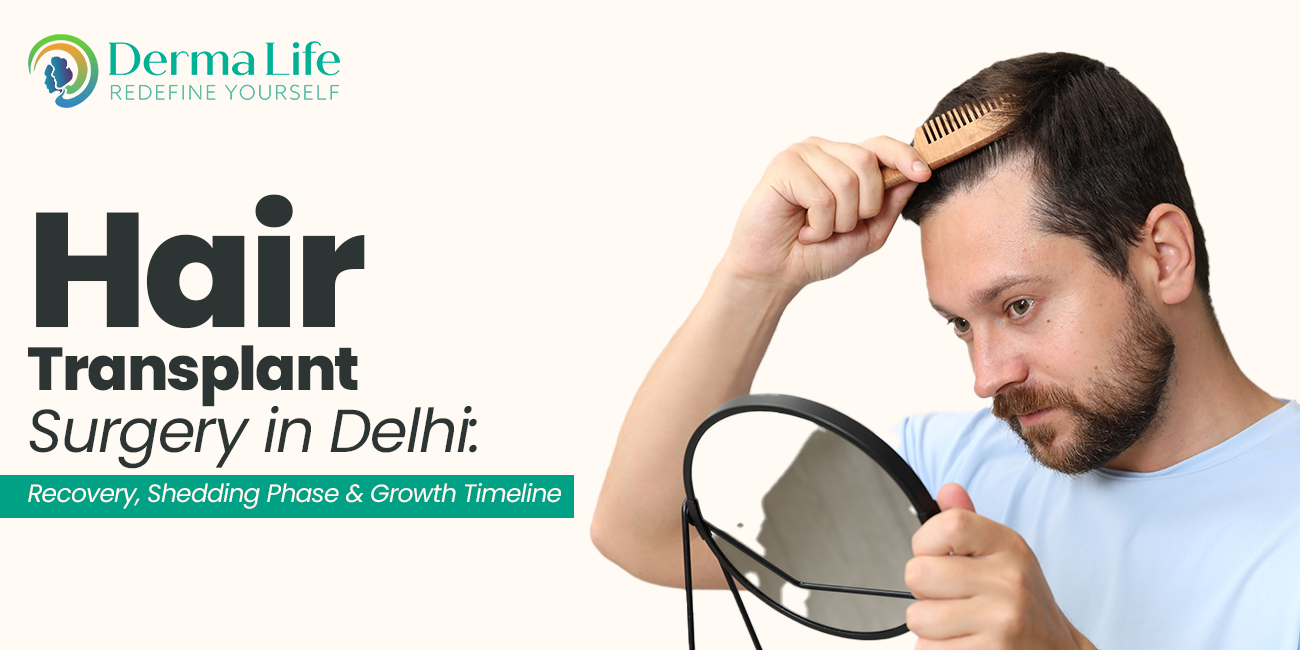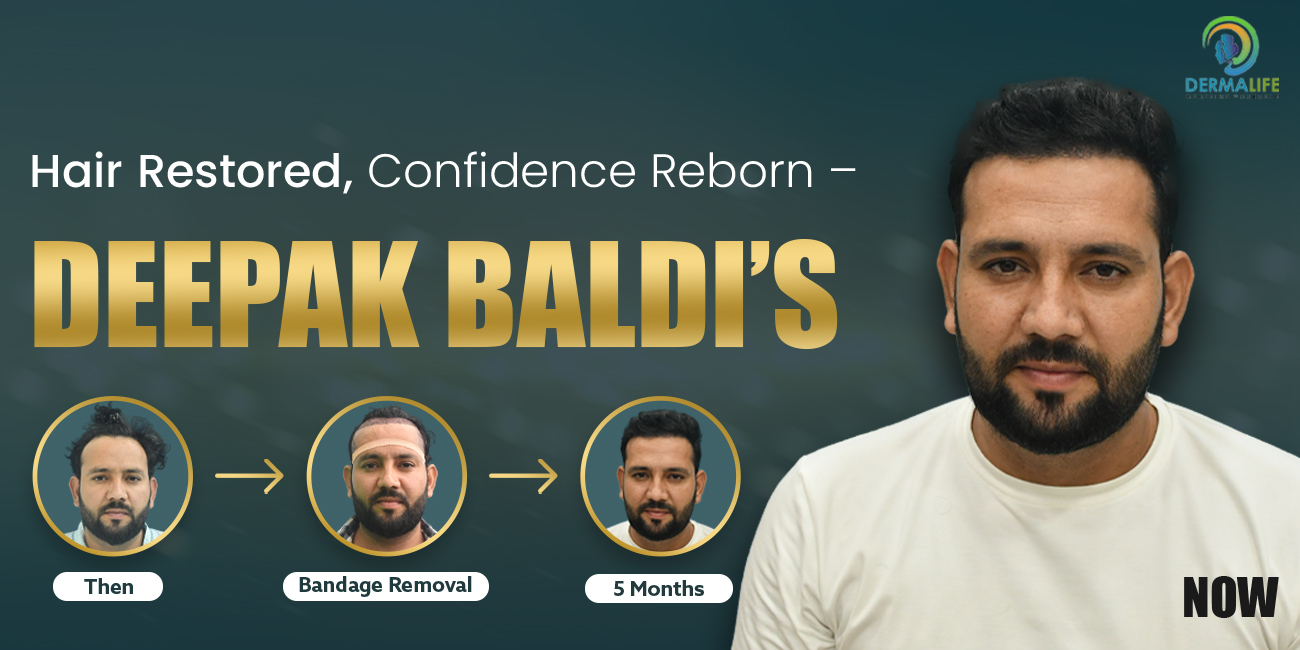PCOS, a hormonal disorder, affects reproductive age, primarily women. The condition causes an excess of androgens, which are male hormones that lead to weight gain and irregular periods. Among many, one of the leading PCOS symptoms is hair thinning, hair loss, and irregular hair on the chin and face.
Also, some women with PCOS experience female pattern hair loss. Polycystic ovary syndrome is a physically as well as emotionally draining condition that occurs during a woman’s reproductive years and is caused by a hormonal imbalance.
A particularly traumatic symptom is PCOS hair loss, which can cause significant trauma to people who suffer from it. Whether you notice loose strands in the shower or a receding hairline, a person needs to understand the reason behind this occurrence and what should be done about it.
It is best to consult an expert for a hair transplant in Delhi once you experience this condition. Dermatologists at Dermalife believe in addressing hair loss holistically and employ advanced technologies to address the condition. Thus, if you are seeking the best options for hair loss due to PCOS, book your appointment with Dermalife Hair Clinic.
How does PCOS cause hair loss?
Hair loss is one of the most reported symptoms of PCOS, and it is one of the problematic symptoms of polycystic ovary syndrome, both on a physical and an emotional level.
PCOS hair loss is caused due to the excess of androgenic hormones in people suffering from this condition. It can also lead to acne, scarring, thinning hair, hair loss, limp, weak hair that breaks easily, and due to dryness. PCOS is a hormonal condition that puts people at risk for female pattern hair loss, and high levels of androgenic hormones are part of the reason for this. However, the exact reasons that high androgen levels lead to female pattern hair loss are still unknown. Hair goes through three main phases as it grows.
- The first phase is the growth phase, known as anagen, during which hair is actively growing longer.
- There is then a short transitional phase of 10 days, which is the end of active hair growth known as catagen.
- After that comes the resting phase, known as telogen, which lasts about three months; when this phase ends, the hair shed is known as exogen. It is very normal to shed several hairs per day because of hairs that are in the rest phase.
Women with PCOS struggle with female pattern hair loss and have a shorter growth phase. The hair spends less time growing before it sheds. Also, more hairs are shed in people with PCOS, as it leads to thinning of the hair on the head in comparison to those who are not suffering from PCOS.
What does hair loss in PCOS look like?
If a female has PCOS and is experiencing hair loss, she may lose up to 100 to 150 hair a day. In general, it is normal to lose 50 to 100 hair per day, so this extra loss may not be obvious initially, and you might not notice you’re losing hair until you’ve lost about 20 to 25 percent of your usual hair volume. In females, pattern hair loss is general hair thinning that starts from the scalp of a person’s head, and the front of your hairline is often unaffected. Hair starts growing thinner as well as shorter at first before failing to grow altogether. This is entirely different from male pattern hair loss, in which the front hairline usually starts reducing and is followed by a bald patch on the top.
What are the signs and symptoms of PCOS hair loss?
PCOS hair loss is medically termed as female pattern baldness. Female bodies produce two types of sex hormones, estrogen as well as progesterone, and androgens, at lower levels. For some women struggling with PCOS, the body produces excessively high levels of androgens, including testosterone. Elevated amounts of androgen levels cause irregular menstrual cycles, infertility, as well as acne. People with PCOS deal with changes in hair growth patterns in areas where excessive hair growth patterns are seen, as well as areas with less hair growth patterns, like the scalp. In women, hormonal patterns of hair loss are termed female pattern hair loss or androgenic alopecia, which usually causes hair thinning and hair loss at the top of the head. Still, the hairline at the upper forehead is usually not affected. This is a different condition from alopecia areata, which is hair loss that is not linked with PCOS. Some common symptoms of PCOS-related hair loss are:
- Hair shedding
If a woman sheds significantly more hair than usual, this may indicate PCOS-related hair loss. Your hair will look thinner than usual, and your hairbrush will gather more hair than normal.
- Dry and itchy scalp
Women struggling with PCOS experience a dry and itchy scalp and may also notice flakes on their dresses.
- Bald spots
A person with PCOS may notice bald patches that appear anywhere on their scalp; however, they most frequently appear on the top of their head. Women also discover that their hair is dry, brittle, and thinner than usual. Owing to this dryness, hair is more prone to breakage during styling, which leads to hair loss.
How does PCOS hair loss progress?
Although every individual’s experience with PCOS hair loss is different, there are some common patterns in the ways the condition progresses. Female pattern hair loss initially starts with steady hair thinning. It usually can be noticed in the front of the scalp or towards the crown. As the hair thinning starts, the part appears wider, and the scalp becomes more visible.
How do dermatologists diagnose PCOS hair loss?
The time you visit expert dermatologists, they might recommend some tests to check if you are suffering from PCOS-related hair loss. Your diagnosis will start by checking your BMI (Body Mass Index), and some suggest blood tests, hormone tests, and an ultrasound examination. However, thyroid deficiency, as well as PCOS, shows similar signs; your dermatologist may look for symptoms that are closely linked with PCOS. These symptoms include the formation of dry skin areas, morning headaches, depression, cold hands, and an increase in testosterone levels.
Treatment of PCOS hair loss – When to consult a dermatologist
You must consult a dermatologist immediately when you lose your hair suddenly, or when your hair loss comes with scalp irritation or color changes. To know the potential treatment options, you should talk with a dermatologist, as this will allow you to get personalized advice to manage this challenging PCOS condition.
How can Dermalife help you with PCOS hair loss?
PCOS hair loss cannot be resolved or reversed on its own, but diagnosing the root cause can help to reverse your hair loss. Keep in mind that it is not an overnight fix as well, though, and this lost hair may take time to grow back. But all good things take time, so it’s worth the persistence. It is best to consult an experienced Dermatologist to get your scalp evaluated and to start your hair loss treatment as early as possible. Experienced dermatologists at renowned skin and hair care clinics like Dermalife can easily detect the root cause of hair loss problems. Expert dermatologists at Dermalife have the perfect solutions for all types of hair issues and thus offer effective hair loss treatment methods for all kinds of hair loss.
-
Hair transplant surgeries
Different techniques are being used for performing hair transplants, including FUT, FUE, and boosted FUE; all these are permanent hair loss solutions that offer excellent outcomes. Hair transplant surgery is one of the most popular and best hair loss treatments in Delhi. This surgical treatment comprises harvesting and transplanting hair from the donor area, like the back of the scalp, which is unaffected by androgenic alopecia. The hair transplant procedure focuses on treating areas where the hair follicle has been miniaturized because of androgens and DHT.
-
Many other options
Several other treatment options, including light therapy, hormone therapy, as well as laser therapy, are also recommended by dermatologists rather than a hair transplant to treat women’s hair loss. With this, some other recommendations for the treatment of hair loss by doctors are medications like Rogaine and Ketoconazole, injections such as Corticosteroids and platelet-rich plasma, along with advice for a good, nutritious diet, and the use of mild shampoos.
Platelet-rich plasma or PRP treatment reduces hair loss and also promotes new hair growth. It is always advisable to visit a dermatologist if you are experiencing severe or continuous hair loss. You must see a dermatologist immediately if you detect a sudden and noticeable increase in hair loss. Unexpected hair loss may indicate a severe problem like PCOS that has to be addressed instantly.
Conclusion
Many think that PCOS hair loss can be hard to deal with, especially if they are already struggling with the effects of this medical condition, but don’t worry, it is effectively treatable. With the support of an expert Dermatologist and a proper routine of treatments as well as remedies that are used consistently, you can get results in a short time frame.
If you have severe PCOS hair loss, seek medical advice as soon as possible, as Dermatologists will be able to prescribe specific hair loss treatments that work to regulate any imbalances in hormones. PCOS hair loss can be reversed owing to many PCOS hair loss therapies that usually focus on preventing more hair loss rather than regrowing any hair that has been lost. However, some treatments can be beneficial.
If you are experiencing hair loss because of PCOS, get in touch with the best of our hair specialists in Delhi at Dermalife Clinic to understand your hair issue. For the best hair treatment or to get an appropriate hair transplant, book an appointment with Dr. Gaurav Garg dermatologist, to get a solution to your hair-related issues. Dermalife, one of the best hair and skin clinics, provides high-quality PCOS hair loss treatment to patients. Expert Dermatologists here provide the best treatment options for hair loss. They take utmost care to diagnose the root cause of your hair loss, with the experts first examining the scalp to diagnose hair loss.
Related Blog – What To Eat After A Hair Transplant?- Food To Eat & Avoid





